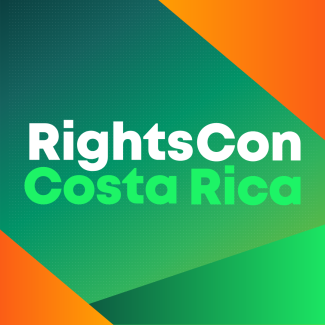AlSur's participation in RightsCon Costa Rica 2023
The organizations of the AlSur consortium had a notorious presence at the 2023 edition of RightsCon in Costa Rica, one of the most important global conferences on human rights in digital environments.
After three years of online editions, as a result of the COVID-19 pandemic, the global conference RightsCon returned to its face-to-face format, taking place in one of the most biodiverse countries in Latin America: Costa Rica. The choice of this country is not minor, since one of the novel and key themes of this meeting was the critical analysis of the role and negative influence of the technology industry in the climate crisis, thus raising a necessary look at environmental justice and intersectionality between digital rights and sustainability.
The 11 AlSur organizations actively participated in a total of 37 sessions (70% of them face-to-face-hybrid and 30% online). Through these sessions, AlSur sought to influence global and regional agendas in regulation and technology policy, build new alliances and propose critical frameworks for analysis of the various international instruments currently being discussed at the international level. Most of these sessions focused on addressing concerns about the regulation of platforms and their role in various areas, such as electoral processes. Topics on content moderation were also discussed, with a strong emphasis on the use of biometric surveillance technologies at borders, which often enable the criminalization of human rights defenders.
At the same time, the consortium organized the private session "Building a Latin American agenda for digital security", which brought together more than 35 representatives of civil society and governments of the region - including Chile, Peru, Brazil, Colombia, Guatemala, Costa Rica, Dominican Republic, Bolivia - and was also attended by the Special Rapporteur for Freedom of Expression of the Inter-American Court of Human Rights (IACHR). In this session, we debated and explored the need to build a Latin American agenda on digital security, a debate that we have been following for some time.
Building a Latin American agenda for digital security
The session was divided into two parts. In the first moment, the situation regarding the discussion of the international Convention on combating cybercrime currently being addressed by the AdHoc Commission within the UN framework was presented; several concerns were raised regarding the criminalization of speech protected by freedom of expression, the transfer of personal data without safeguards and the potential legitimization of intrusive forms of surveillance. On the other hand, the situation of the cybersecurity policy agenda at the level of several Latin American governments was addressed, advocating the need for them to strengthen the capacities of incident response centers, the gender perspective and promote the protection of people's information, rather than prioritizing securitization and monitoring of the digital space.
RightsCon thus offered a key opportunity for dialogue among various stakeholders, as well as a meeting to strengthen ties internally and with other networks globally. As a consortium, we were also able to concretize our visions and work perspectives towards the projects we will promote between 2023 and 2024. Having RightsCon in a Latin American country was also very symbolic for our organizations, as it allowed for a greater presence of people from the majority South than in previous versions, even though the discussion and priorities of the event's agenda were not necessarily focused on the interests and needs of these countries.
Beyond that, we see RightsCon as a vital space for our community and for advancing the work we do as organizations. We are already looking forward to the next meeting.



